
Blog (871)
How Often Should Running Shoes Be Purchased?
 Research has indicated it may be beneficial to purchase running shoes based on the type of running that is desired. When shoes are changed approximately every five hundred miles, they may last as long as they can before they lose their elasticity. Many runners are aware of the importance of having two pairs of running shoes, and alternating between them. When shoes are purchased, it is helpful to look for shoes that have a solid heel. This may ensure the ankle is kept stable. If the shoe is easy to twist, it generally indicates this type of running shoe has less midfoot support. If you are interested in learning more about how to buy running shoes, it is advised that you consult with a podiatrist who can offer you useful tips.
Research has indicated it may be beneficial to purchase running shoes based on the type of running that is desired. When shoes are changed approximately every five hundred miles, they may last as long as they can before they lose their elasticity. Many runners are aware of the importance of having two pairs of running shoes, and alternating between them. When shoes are purchased, it is helpful to look for shoes that have a solid heel. This may ensure the ankle is kept stable. If the shoe is easy to twist, it generally indicates this type of running shoe has less midfoot support. If you are interested in learning more about how to buy running shoes, it is advised that you consult with a podiatrist who can offer you useful tips.
You should always make sure your running shoes fit properly in order to avoid injury. For more information, contact one of our podiatrists from Westland Foot & Ankle Specialists, P.C.. Our doctors can provide the care you need to keep you pain-free and on your feet.
Choosing the Right Running Shoe for Your Foot Type
Improper shoe sizing can cause a myriad of problems for your feet. Shoes that don’t fit you properly can lead to muscular imbalances in your body, which can result in foot, knee, and hip injuries.
Tips for Finding the Right Running Shoe
- Make sure you have a thumb’s width of wiggle room between the end of your longest toe and the front of the shoe.
- There should be little to no slipping at the heel
- Don’t assume your size in one shoe brand will be your size in another
- Do not lace up your shoes too tightly
- Walk around in the store with your new shoes before you buy them
If you have any questions please feel free to contact our our office located in Westland, MI. . We offer the newest diagnostic and treatment technologies for all your foot and ankle needs.
How Do Cracked Heels Develop?
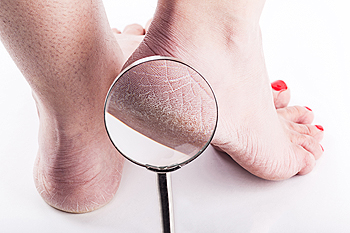 Severe cases of the condition known as cracked heels can cause extreme pain and discomfort. They are deep cracks in the skin that are known as fissures, and generally occur on the outside of the heel. It is an ailment that develops gradually, and will be manageable with prompt treatment. Some of the symptoms of cracked heels can include flaky and peeling skin, hardened and red skin, and the area may itch. Common causes of this condition can consist of standing for extended periods of time throughout the day, and wearing shoes that do not fit correctly. Additionally, certain medical conditions such as psoriasis and thyroid disease may play a significant role in developing cracked heels. Relief may be temporarily felt when a good moisturizer is applied to the affected area. If you would like more information about how to treat and prevent cracked heels from developing, it is suggested that you speak to a podiatrist.
Severe cases of the condition known as cracked heels can cause extreme pain and discomfort. They are deep cracks in the skin that are known as fissures, and generally occur on the outside of the heel. It is an ailment that develops gradually, and will be manageable with prompt treatment. Some of the symptoms of cracked heels can include flaky and peeling skin, hardened and red skin, and the area may itch. Common causes of this condition can consist of standing for extended periods of time throughout the day, and wearing shoes that do not fit correctly. Additionally, certain medical conditions such as psoriasis and thyroid disease may play a significant role in developing cracked heels. Relief may be temporarily felt when a good moisturizer is applied to the affected area. If you would like more information about how to treat and prevent cracked heels from developing, it is suggested that you speak to a podiatrist.
Cracked heels are unsightly and can cause further damage to your shoes and feet. If you have any concerns, contact one of our podiatrists from Dr. Kane & Associates, P.C. Our doctors can provide the care you need to keep you pain-free and on your feet.
Cracked Heels
Cracked heels appear unappealing and can make it harder for you walk around in sandals. Aside from looking unpleasant, cracked heels can also tear stockings, socks, and wear out your shoes. There are several methods to help restore a cracked heel and prevent further damage.
How Do You Get Them?
Dry skin is the number one culprit in creating cracked heels. Many athletes, walkers, joggers, and even swimmers suffer from cracked heels. Age and skin oil production play a role to getting cracked heels as well.
Promote Healing
Over the counter medicines can help, especially for those that need instant relief or who suffer from chronic dry feet.
Wear Socks – Wearing socks with medicated creams helps lock in moisture.
Moisturizers – Applying both day and night will help alleviate dryness which causes cracking.
Pumice Stones – These exfoliate and remove dead skin, which allows for smoother moisturizer application and better absorption into the skin.
Change in Diet
Eating healthy with a well-balanced diet will give the skin a fresh and radiant look. Your body responds to the kinds of food you ingest. Omega-3 fatty acids and zinc supplements can also revitalize skin tissue.
Most importantly, seek professional help if unsure how to proceed in treating cracked heels. A podiatrist will help you with any questions or information needed.
If you have any questions, please feel free to contact our office located in Westland, MI.. We offer the newest diagnostic and treatment technologies for all your foot care needs.
Read more about Solutions for Cracked HeelsHow Do Cracked Heels Develop?
 Severe cases of the condition known as cracked heels can cause extreme pain and discomfort. They are deep cracks in the skin that are known as fissures, and generally occur on the outside of the heel. It is an ailment that develops gradually, and will be manageable with prompt treatment. Some of the symptoms of cracked heels can include flaky and peeling skin, hardened and red skin, and the area may itch. Common causes of this condition can consist of standing for extended periods of time throughout the day, and wearing shoes that do not fit correctly. Additionally, certain medical conditions such as psoriasis and thyroid disease may play a significant role in developing cracked heels. Relief may be temporarily felt when a good moisturizer is applied to the affected area. If you would like more information about how to treat and prevent cracked heels from developing, it is suggested that you speak to a podiatrist.
Severe cases of the condition known as cracked heels can cause extreme pain and discomfort. They are deep cracks in the skin that are known as fissures, and generally occur on the outside of the heel. It is an ailment that develops gradually, and will be manageable with prompt treatment. Some of the symptoms of cracked heels can include flaky and peeling skin, hardened and red skin, and the area may itch. Common causes of this condition can consist of standing for extended periods of time throughout the day, and wearing shoes that do not fit correctly. Additionally, certain medical conditions such as psoriasis and thyroid disease may play a significant role in developing cracked heels. Relief may be temporarily felt when a good moisturizer is applied to the affected area. If you would like more information about how to treat and prevent cracked heels from developing, it is suggested that you speak to a podiatrist.
Cracked heels are unsightly and can cause further damage to your shoes and feet. If you have any concerns, contact one of our podiatrists from Westland Foot & Ankle Specialists, P.C.. Our doctors can provide the care you need to keep you pain-free and on your feet.
Cracked Heels
Cracked heels appear unappealing and can make it harder for you walk around in sandals. Aside from looking unpleasant, cracked heels can also tear stockings, socks, and wear out your shoes. There are several methods to help restore a cracked heel and prevent further damage.
How Do You Get Them?
Dry skin is the number one culprit in creating cracked heels. Many athletes, walkers, joggers, and even swimmers suffer from cracked heels. Age and skin oil production play a role to getting cracked heels as well.
Promote Healing
Over the counter medicines can help, especially for those that need instant relief or who suffer from chronic dry feet.
Wear Socks – Wearing socks with medicated creams helps lock in moisture.
Moisturizers – Applying both day and night will help alleviate dryness which causes cracking.
Pumice Stones – These exfoliate and remove dead skin, which allows for smoother moisturizer application and better absorption into the skin.
Change in Diet
Eating healthy with a well-balanced diet will give the skin a fresh and radiant look. Your body responds to the kinds of food you ingest. Omega-3 fatty acids and zinc supplements can also revitalize skin tissue.
Most importantly, seek professional help if unsure how to proceed in treating cracked heels. A podiatrist will help you with any questions or information needed.
If you have any questions, please feel free to contact our office located in Westland, MI. . We offer the newest diagnostic and treatment technologies for all your foot care needs.
Do Your Child's Feet Hurt?
Do Your Child's Feet Hurt?
Ankle Tendonitis May Be A Common Form of Foot Pain
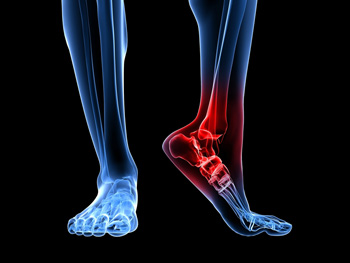 A common form of ankle pain is known as tendonitis. It is an inflammation of the tendons, and can occur as a result of an ankle sprain. This can happen when the tendons are stretched beyond their normal range. The symptoms that are generally associated with ankle tendonitis can consist of severe pain, swelling, and difficulty walking. It is important to obtain a proper diagnosis as soon as possible. The average time for a full recovery can range between two to three months, and it is important to obtain a proper diagnosis so the correct treatment can begin. There are a variety of reasons why this condition may develop. These can include participating in sporting activities where the tendons are overstretched, genetic factors that can cause an abnormal foot structure, or medical conditions such as rheumatoid arthritis and gout. If you have injured your ankle and are experiencing pain and discomfort, it is advised that you consult with a podiatrist who can properly treat this condition.
A common form of ankle pain is known as tendonitis. It is an inflammation of the tendons, and can occur as a result of an ankle sprain. This can happen when the tendons are stretched beyond their normal range. The symptoms that are generally associated with ankle tendonitis can consist of severe pain, swelling, and difficulty walking. It is important to obtain a proper diagnosis as soon as possible. The average time for a full recovery can range between two to three months, and it is important to obtain a proper diagnosis so the correct treatment can begin. There are a variety of reasons why this condition may develop. These can include participating in sporting activities where the tendons are overstretched, genetic factors that can cause an abnormal foot structure, or medical conditions such as rheumatoid arthritis and gout. If you have injured your ankle and are experiencing pain and discomfort, it is advised that you consult with a podiatrist who can properly treat this condition.
Foot Pain
Foot pain can be extremely painful and debilitating. If you have a foot pain, consult with one of our podiatrists from Dr. Kane & Associates, P.C. Our doctors will assess your condition and provide you with quality foot and ankle treatment.
Causes
Foot pain is a very broad condition that could be caused by one or more ailments. The most common include:
- Bunions
- Hammertoes
- Plantar Fasciitis
- Bone Spurs
- Corns
- Tarsal Tunnel Syndrome
- Ingrown Toenails
- Arthritis (such as Gout, Rheumatoid, and Osteoarthritis)
- Flat Feet
- Injury (from stress fractures, broken toe, foot, ankle, Achilles tendon ruptures, and sprains)
- And more
Diagnosis
To figure out the cause of foot pain, podiatrists utilize several different methods. This can range from simple visual inspections and sensation tests to X-rays and MRI scans. Prior medical history, family medical history, and any recent physical traumatic events will all be taken into consideration for a proper diagnosis.
Treatment
Treatment depends upon the cause of the foot pain. Whether it is resting, staying off the foot, or having surgery; podiatrists have a number of treatment options available for foot pain.
If you have any questions, please feel free to contact our office located in Westland, MI.. We offer the newest diagnostic and treatment technologies for all your foot care needs.
Read more about Foot PainAnkle Tendonitis May Be A Common Form of Foot Pain
 A common form of ankle pain is known as tendonitis. It is an inflammation of the tendons, and can occur as a result of an ankle sprain. This can happen when the tendons are stretched beyond their normal range. The symptoms that are generally associated with ankle tendonitis can consist of severe pain, swelling, and difficulty walking. It is important to obtain a proper diagnosis as soon as possible. The average time for a full recovery can range between two to three months, and it is important to obtain a proper diagnosis so the correct treatment can begin. There are a variety of reasons why this condition may develop. These can include participating in sporting activities where the tendons are overstretched, genetic factors that can cause an abnormal foot structure, or medical conditions such as rheumatoid arthritis and gout. If you have injured your ankle and are experiencing pain and discomfort, it is advised that you consult with a podiatrist who can properly treat this condition.
A common form of ankle pain is known as tendonitis. It is an inflammation of the tendons, and can occur as a result of an ankle sprain. This can happen when the tendons are stretched beyond their normal range. The symptoms that are generally associated with ankle tendonitis can consist of severe pain, swelling, and difficulty walking. It is important to obtain a proper diagnosis as soon as possible. The average time for a full recovery can range between two to three months, and it is important to obtain a proper diagnosis so the correct treatment can begin. There are a variety of reasons why this condition may develop. These can include participating in sporting activities where the tendons are overstretched, genetic factors that can cause an abnormal foot structure, or medical conditions such as rheumatoid arthritis and gout. If you have injured your ankle and are experiencing pain and discomfort, it is advised that you consult with a podiatrist who can properly treat this condition.
Foot Pain
Foot pain can be extremely painful and debilitating. If you have a foot pain, consult with one of our podiatrists from Westland Foot & Ankle Specialists, P.C.. Our doctors will assess your condition and provide you with quality foot and ankle treatment.
Causes
Foot pain is a very broad condition that could be caused by one or more ailments. The most common include:
- Bunions
- Hammertoes
- Plantar Fasciitis
- Bone Spurs
- Corns
- Tarsal Tunnel Syndrome
- Ingrown Toenails
- Arthritis (such as Gout, Rheumatoid, and Osteoarthritis)
- Flat Feet
- Injury (from stress fractures, broken toe, foot, ankle, Achilles tendon ruptures, and sprains)
- And more
Diagnosis
To figure out the cause of foot pain, podiatrists utilize several different methods. This can range from simple visual inspections and sensation tests to X-rays and MRI scans. Prior medical history, family medical history, and any recent physical traumatic events will all be taken into consideration for a proper diagnosis.
Treatment
Treatment depends upon the cause of the foot pain. Whether it is resting, staying off the foot, or having surgery; podiatrists have a number of treatment options available for foot pain.
If you have any questions, please feel free to contact our office located in Westland, MI. . We offer the newest diagnostic and treatment technologies for all your foot care needs.
Can Orthotics Help Bunions?
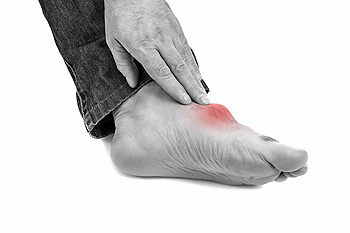 A bunion is the name that is given for the large bony protrusion that develops on the side and bottom of the big toe. It can develop for a variety of reasons, some of which can include genetic factors, foot injuries, and ill-fitting footwear. The bump that forms may appear red from friction that is caused by shoes, and calluses and corns may also develop on the affected area. Patients who have severe bunions may experience pain and discomfort, and have difficulty walking. People who realize they have a bunion may find mild relief in wearing shoes that have ample room for the toes to move freely in. If you are afflicted with a bunion, it is strongly advised that you speak with a podiatrist who can prescribe orthotics which may help you to find comfort.
A bunion is the name that is given for the large bony protrusion that develops on the side and bottom of the big toe. It can develop for a variety of reasons, some of which can include genetic factors, foot injuries, and ill-fitting footwear. The bump that forms may appear red from friction that is caused by shoes, and calluses and corns may also develop on the affected area. Patients who have severe bunions may experience pain and discomfort, and have difficulty walking. People who realize they have a bunion may find mild relief in wearing shoes that have ample room for the toes to move freely in. If you are afflicted with a bunion, it is strongly advised that you speak with a podiatrist who can prescribe orthotics which may help you to find comfort.
If you are suffering from bunion pain, contact one of our podiatrists of Dr. Kane & Associates, P.C. Our doctors can provide the care you need to keep you pain-free and on your feet.
What Is a Bunion?
Bunions are painful bony bumps that usually develop on the inside of the foot at the joint of the big toe. As the deformity increases over time, it may become painful to walk and wear shoes. Women are more likely to exacerbate existing bunions since they often wear tight, narrow shoes that shift their toes together. Bunion pain can be relieved by wearing wider shoes with enough room for the toes.
Causes
- Genetics – some people inherit feet that are more prone to bunion development
- Inflammatory Conditions - rheumatoid arthritis and polio may cause bunion development
Symptoms
- Redness and inflammation
- Pain and tenderness
- Callus or corns on the bump
- Restricted motion in the big toe
In order to diagnose your bunion, your podiatrist may ask about your medical history, symptoms, and general health. Your doctor might also order an x-ray to take a closer look at your feet. Nonsurgical treatment options include orthotics, padding, icing, changes in footwear, and medication. If nonsurgical treatments don’t alleviate your bunion pain, surgery may be necessary.
If you have any questions, please feel free to contact our office located in Westland, MI.. We offer the newest diagnostic and treatment technologies for all your foot care needs.
Read more about BunionsCan Orthotics Help Bunions?
 A bunion is the name that is given for the large bony protrusion that develops on the side and bottom of the big toe. It can develop for a variety of reasons, some of which can include genetic factors, foot injuries, and ill-fitting footwear. The bump that forms may appear red from friction that is caused by shoes, and calluses and corns may also develop on the affected area. Patients who have severe bunions may experience pain and discomfort, and have difficulty walking. People who realize they have a bunion may find mild relief in wearing shoes that have ample room for the toes to move freely in. If you are afflicted with a bunion, it is strongly advised that you speak with a podiatrist who can prescribe orthotics which may help you to find comfort.
A bunion is the name that is given for the large bony protrusion that develops on the side and bottom of the big toe. It can develop for a variety of reasons, some of which can include genetic factors, foot injuries, and ill-fitting footwear. The bump that forms may appear red from friction that is caused by shoes, and calluses and corns may also develop on the affected area. Patients who have severe bunions may experience pain and discomfort, and have difficulty walking. People who realize they have a bunion may find mild relief in wearing shoes that have ample room for the toes to move freely in. If you are afflicted with a bunion, it is strongly advised that you speak with a podiatrist who can prescribe orthotics which may help you to find comfort.
If you are suffering from bunion pain, contact one of our podiatrists of Westland Foot & Ankle Specialists, P.C.. Our doctors can provide the care you need to keep you pain-free and on your feet.
What Is a Bunion?
Bunions are painful bony bumps that usually develop on the inside of the foot at the joint of the big toe. As the deformity increases over time, it may become painful to walk and wear shoes. Women are more likely to exacerbate existing bunions since they often wear tight, narrow shoes that shift their toes together. Bunion pain can be relieved by wearing wider shoes with enough room for the toes.
Causes
- Genetics – some people inherit feet that are more prone to bunion development
- Inflammatory Conditions - rheumatoid arthritis and polio may cause bunion development
Symptoms
- Redness and inflammation
- Pain and tenderness
- Callus or corns on the bump
- Restricted motion in the big toe
In order to diagnose your bunion, your podiatrist may ask about your medical history, symptoms, and general health. Your doctor might also order an x-ray to take a closer look at your feet. Nonsurgical treatment options include orthotics, padding, icing, changes in footwear, and medication. If nonsurgical treatments don’t alleviate your bunion pain, surgery may be necessary.
If you have any questions, please feel free to contact our office located in Westland, MI. . We offer the newest diagnostic and treatment technologies for all your foot care needs.
Different Shoes for Different Types of Running
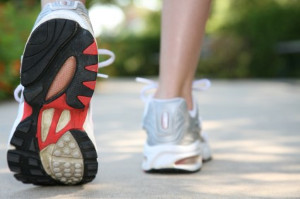 People who enjoy running are generally aware of the importance of choosing the right running shoe. These types of shoes fall into different categories based on running style. Additionally, for heavier runners, it is helpful to select shoes that have added stability. Research has indicated that determining how often running is practiced can help you to choose the correct shoe style. If your style of running includes exposure to mountains or trails, it may be beneficial to choose shoes that have additional traction. It is suggested that you consult with a podiatrist who can help you to determine which type of running shoe is best for you.
People who enjoy running are generally aware of the importance of choosing the right running shoe. These types of shoes fall into different categories based on running style. Additionally, for heavier runners, it is helpful to select shoes that have added stability. Research has indicated that determining how often running is practiced can help you to choose the correct shoe style. If your style of running includes exposure to mountains or trails, it may be beneficial to choose shoes that have additional traction. It is suggested that you consult with a podiatrist who can help you to determine which type of running shoe is best for you.
If you are a runner, wearing the right running shoe is essential. For more information, contact one of our podiatrists from Dr. Kane & Associates, P.C. Our doctors can provide the care you need to keep you pain-free and on your feet.
Choosing the Right Running Shoe for Your Foot Type
To increase performance and avoid the risk of injury, it is important to choose the right running shoe based on your foot type. The general design of running shoes revolves around pronation, which is how the ankle rolls from outside to inside when the foot strikes the ground.
- Neutral runners are able to choose from a wide variety of shoes, including minimalist shoes or even going barefoot.
- Runners who overpronate, or experience an over-abundance of ankle rolling, should choose shoes that provide extra motion control and stability.
- Runners who underpronate, or supinate, have feet that have high arches and lack flexibility, preventing shock absorption. They require shoes with more flexibility and cushion.
If you have any questions please feel free to contact our office located in Westland, MI.. We offer the newest diagnostic and treatment technologies for all your foot and ankle needs.
Read more about Choosing the Right Running Shoe for Your Foot TypeMore...
Different Shoes for Different Types of Running
 People who enjoy running are generally aware of the importance of choosing the right running shoe. These types of shoes fall into different categories based on running style. Additionally, for heavier runners, it is helpful to select shoes that have added stability. Research has indicated that determining how often running is practiced can help you to choose the correct shoe style. If your style of running includes exposure to mountains or trails, it may be beneficial to choose shoes that have additional traction. It is suggested that you consult with a podiatrist who can help you to determine which type of running shoe is best for you.
People who enjoy running are generally aware of the importance of choosing the right running shoe. These types of shoes fall into different categories based on running style. Additionally, for heavier runners, it is helpful to select shoes that have added stability. Research has indicated that determining how often running is practiced can help you to choose the correct shoe style. If your style of running includes exposure to mountains or trails, it may be beneficial to choose shoes that have additional traction. It is suggested that you consult with a podiatrist who can help you to determine which type of running shoe is best for you.
If you are a runner, wearing the right running shoe is essential. For more information, contact one of our podiatrists from Westland Foot & Ankle Specialists, P.C.. Our doctors can provide the care you need to keep you pain-free and on your feet.
Choosing the Right Running Shoe for Your Foot Type
To increase performance and avoid the risk of injury, it is important to choose the right running shoe based on your foot type. The general design of running shoes revolves around pronation, which is how the ankle rolls from outside to inside when the foot strikes the ground.
- Neutral runners are able to choose from a wide variety of shoes, including minimalist shoes or even going barefoot.
- Runners who overpronate, or experience an over-abundance of ankle rolling, should choose shoes that provide extra motion control and stability.
- Runners who underpronate, or supinate, have feet that have high arches and lack flexibility, preventing shock absorption. They require shoes with more flexibility and cushion.
If you have any questions please feel free to contact our office located in Westland, MI. . We offer the newest diagnostic and treatment technologies for all your foot and ankle needs.
Before you start dancing...
Before you start dancing...
Is My Toe Broken?
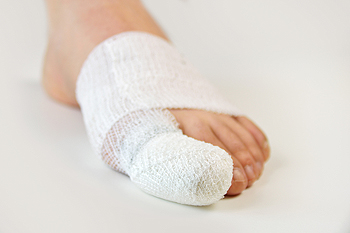 Research has shown the importance of promptly treating a broken toe. This may help to ensure proper healing of the fractured toe. Some of the symptoms that are typically associated with a broken toe can consist of bruising, swelling, and having difficulty moving the toe. For mild breaks, an effective treatment consists of taping the injured toe to an adjacent toe. This is referred to as buddy taping. This type of treatment generally provides the stability that is needed as the healing process occurs. The average recovery time for a broken toe to heal is approximately four weeks. During this time, your toe may feel better when walking is limited, and keeping it elevated may also help to alleviate any existing swelling. If you have broken your toe, it is advised that you seek the counsel of a podiatrist who can help you to manage this condition.
Research has shown the importance of promptly treating a broken toe. This may help to ensure proper healing of the fractured toe. Some of the symptoms that are typically associated with a broken toe can consist of bruising, swelling, and having difficulty moving the toe. For mild breaks, an effective treatment consists of taping the injured toe to an adjacent toe. This is referred to as buddy taping. This type of treatment generally provides the stability that is needed as the healing process occurs. The average recovery time for a broken toe to heal is approximately four weeks. During this time, your toe may feel better when walking is limited, and keeping it elevated may also help to alleviate any existing swelling. If you have broken your toe, it is advised that you seek the counsel of a podiatrist who can help you to manage this condition.
A broken toe can be very painful and lead to complications if not properly fixed. If you have any concerns about your feet, contact one of our podiatrists from Dr. Kane & Associates, P.C. Our doctors will treat your foot and ankle needs.
What to Know About a Broken Toe
Although most people try to avoid foot trauma such as banging, stubbing, or dropping heavy objects on their feet, the unfortunate fact is that it is a common occurrence. Given the fact that toes are positioned in front of the feet, they typically sustain the brunt of such trauma. When trauma occurs to a toe, the result can be a painful break (fracture).
Symptoms of a Broken Toe
- Throbbing pain
- Swelling
- Bruising on the skin and toenail
- The inability to move the toe
- Toe appears crooked or disfigured
- Tingling or numbness in the toe
Generally, it is best to stay off of the injured toe with the affected foot elevated.
Severe toe fractures may be treated with a splint, cast, and in some cases, minor surgery. Due to its position and the pressure it endures with daily activity, future complications can occur if the big toe is not properly treated.
If you have any questions please feel free to contact our office located in Westland, MI.. We offer the newest diagnostic and treatment technologies for all your foot and ankle needs.
Read more about What to Know About a Broken Toe


